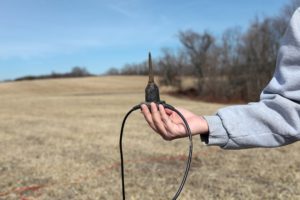All Categories
Featured
Table of Contents
Geophysical Surveys in Perth Western Australia 2022

Other possible geophysicist majors that aren't geophysics or geoscience consist of: Climatic sciences and meteorology Chemical and physical oceanography Earth science Environmental science Hydrology and water resources science Materials science By earning any geophysicist degree, and by taking the necessary geology courses, you must qualify for an entry-level position as a geoscientist or geophysicist.
Ultimately, students must discover: a branch of geology that looks at the various aspects of minerals, including chemical structure, internal crystal structure, and physical properties. the research study of rocks and the procedures and conditions that form and change them gradually. There are a couple of subdivisions in this branch of geology, consisting of igneous, metamorphic, and sedimentary rocks.

This field analyzes structural rock features such as cleavage, faults, joints, and little folds. They should also find out the computer abilities essential to: examine information produce digital designs and maps run geoscientists' software application Trainees need to also take advantage of all chances to acquire real-world experience. Hopeful geophysicists should expect to hang out knowing: in the classroom in the field in laboratories Obviously, skills taught in the class are extremely important for aiming geophysicists.
Geophysical Services in Jolimont WA 2023
For example, geoscientists spend a great deal of their time outside when operating in the field, so they should possess "outdoor skills" like outdoor camping and operating boats, aircraft, and other cars. Because they spend a lot time in remote locations, it's essential that geophysicists likewise have the physical endurance to carry essential equipment on their hikes to places of study.
The task provides: a high average and top revenues a high rate of personal complete satisfaction among geophysicists low work stress positive job outlook Further info on earnings potential and task outlook is detailed below. For trainees looking to land an entry-level function as a geoscientist or geophysicist, it takes 4 years, or the time needed to finish a bachelor's degree in geophysics or a related discipline.
Some research study positions in geophysics need doctoral degrees. Also, if you prepare to teach at a college or university, you should make a Ph - Geophysical Methods Commonly Employed For Geotechnical ... in Waterford Aus 2021. D. in geophysics or a related field. The time it takes to make a Ph. D. differs by organization and program, however it usually takes four to 6 years beyond the bachelor's degree.
How To Become A Geophysicist in Crawley Aus 2022
Many employers require candidates to have a bachelor's degree in geophysics or a carefully associated discipline for all entry-level positions. As an outcome, there's no method around the degree requirements for becoming a geophysicist.
Currently, 31 states need licensing for geologists, although licensing is not always needed, specifically for entry-level work. The states that do concern licenses use the Principles of Geology Examination (FGE), which is administered through the National Association of State Boards of Geology (ASBOG). Now that you know which degree for geophysicist tasks you require, you'll need to land a job, and it's essential to learn just how much money you can make in this profession.
According to BLS, the typical annual wage for geoscientists is $93,580. According to BLS, certain markets use greater incomes for geoscientists, and in some cases, they provide higher-than-average revenues.
Geologists And Geophysicists in Bayswater Aus 2022
In fact, mining, quarrying, and oil and gas extraction offers over $32,000 more every year than the average annual wage for this occupation. The federal government, too, provides over $10,000 more in revenues than the national average for geoscientists. In addition to industry type, geographical place can considerably affect earnings for this profession.

The top-paying states and their yearly mean earnings, according to the BLS, consist of: Texas $166,720 Oklahoma $149,630 Pennsylvania $120,590 Hawaii $120,130 Colorado $107,260 These five top-paying states provide much higher wages than the average for this profession. Earnings for geoscientists in Texas are over $73,000 greater than the nationwide average.
It needs to come as no surprise that the majority of these high-paying areas are in Texas and Oklahoma, but some are discovered in California, Louisiana, and Colorado. The leading 10 highest-paying city locations for geoscientists are: Houston-The Woodlands-Sugar Land, Texas: $188,400 Tulsa, Oklahoma: $186,490 Midland, Texas: $167,040 Odessa, Texas: $147,080 Oklahoma City, Oklahoma: $145,350 Bakersfield, California: $130,080 Urban Honolulu, Hawaii: $124,470 New Orleans-Metairie, Louisiana: $121,030 Washington-Arlington-Alexandria, DC, VA, MD, WV: $120,180 Denver-Aurora-Lakewood, Colorado: $116,910 For some geoscientists and geophysicists, residing in a metro city is not as attractive as residing in a smaller sized community.
Latest Posts
Geophysicist - Job Role - Job Information in Mahogany Creek Oz 2023
Integrated Geophysical Surveys For The Safety in Koondoola Oz 2020
What Does A Geologist Do? in Pickering Brook WA 2021